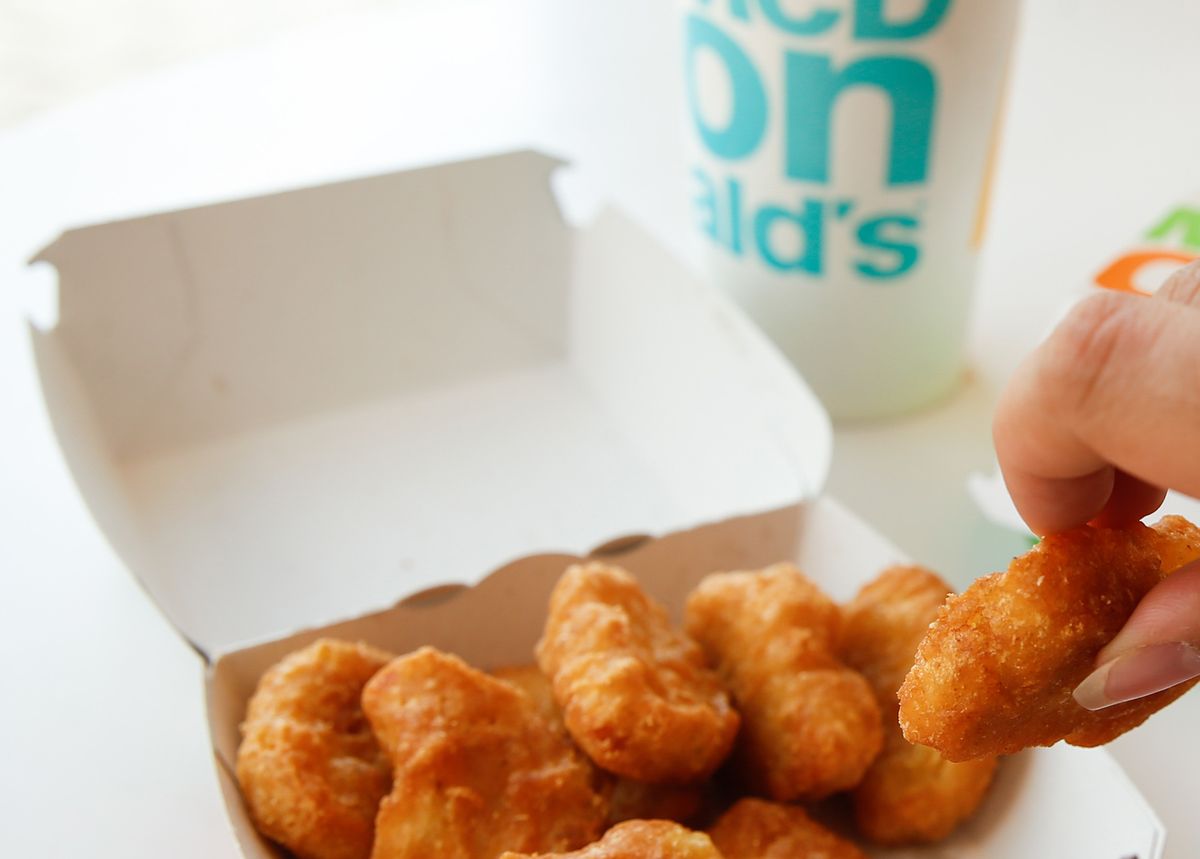
Image courtesy of Getty Images
On Oct. 1, 2022, an X user posted a thread claiming that McDonald’s uses silicone oil to fry McNuggets. This post amassed 400 likes and almost 50 comments. Many reacted in disgust, one commenter saying, “That’s wild. I’ve always thought they had a weird silicon mouthfeel.”
The post is based on the perception that McDonald’s, along with many other fast food chains in the U.S., uses an anti-foaming agent, dimethylpolysiloxane, in the oil used to fry food. Until August 2016, McDonald’s noted the antifoaming agent in its list of ingredients for Chicken McNuggets. But as of 2016, McDonald’s no longer lists dimethylpolysiloxane in its ingredients for the item, at least in the U.S. and U.K., therefore we are labeling the claim “Outdated.”
Similar claims surfaced before the 2022 post, with many articles and blog posts written on the subject. An article from National Post published in 2011 titled, “What’s in those silly McNuggets?” talks about the existence of dimethylpolysiloxane in the make-up of Chicken McNuggets, for example. The article states:
“What do McDonald’s Chicken McNuggets and Silly Putty have in common?” asks Joseph Mercola, who claims to have the most-visited health site on the Internet. The answer is dimethyl polysiloxane, which is the major component of Silly Putty and is added as an anti-foaming agent to the oil used to fry the nuggets.
Mercola’s implication is that you wouldn’t want to eat something that’s also found in Silly Putty. But do we eschew salt because it is used to de-ice streets, or water because it is an essential ingredient of cement? Dimethyl polysiloxane is an approved additive for frying oils, at a level of roughly five parts per million. As with any chemical, there is a dose at which it becomes toxic. What is that dose? You would have to eat about 10,000 nuggets at one sitting to approach any sort of toxic level.”
The most current Code of Federal Regulations Title 21, as of Dec. 22, 2023, establishes the limit of dimethylpolysiloxane in food as, “Addition to food not to exceed 1 part per million.” This more current figure would refute the National Post’s claim. Although its figure isn’t up-to-date, the Post’s claim that the chemical is safe is true, at least at certain levels.
In an article from Isitbadforyou.com published in 2016, the writer states, “As sinister as dimethylpolysiloxane sounds, there is no definitive proof that it poses any immediate danger to your health. When looking at other ingredients found in products/foods containing the additive, dimethylpolysiloxane becomes the least of your worries.”
Another article, from Deep Sea Silicone published in 2023, also shares that sentiment, stating, “In summary, dimethicone is safe to add in small amounts to food, but there may be risks associated with excessive use. In order to ensure food safety, it is recommended to strictly comply with relevant regulations and standards when adding dimethylpolysiloxane, and at the same time strengthen research and monitoring of its safety.” Dimethicone is another name for dimethylpolysiloxane. Both of these articles share the sentiment that this chemical is safe in foods, albeit in very small amounts.
A McDonald’s U.S. Ingredients list from November 2013 includes the following ingredients in Chicken McNuggets: “Dimethylpolysiloxane added as an antifoaming agent. Prepared in vegetable oil (Canola oil, corn oil, soybean oil, hydrogenated soybean oil with TBHQ and citric acid added to preserve freshness).” At the end of the list, the company writes, “This information is correct as of November 2013, unless stated otherwise.”
Meanwhile, McDonald’s Canada listed the additive in the first page of its ingredients, published on Sept. 18, 2019.
“Our fried menu items are cooked in a vegetable oil blend with citric acid added as a processing aid and dimethylpolysiloxane to reduce oil splatter when cooking. “
“Dimethylpolysiloxane (DMPS) is not an ingredient in our McDonald’s U.K. Fries. You can find a full ingredient declaration for all food (including our burgers) served in the U.K. by visiting our online nutritional calculator tool here or downloading our Allergen Booklet here.”
That statement was posted under the FAQ, “Do McDonald’s fries contain dimethylpolysiloxane (a form of silicone)?” The search result was from the United Kingdom’s McDonald’s website. When searching the United States’ McDonald’s website for dimethylpolysiloxane, no search results appeared.
In August of 2016, McDonald’s announced major changes to its U.S. menu. In the article posted to the company’s website, it stated:
“McDonald’s USA today announced a number of moves across its menu as the company continues to evolve. This includes:
removing artificial preservatives from several items which also don’t have artificial colors or flavors, including its iconic Chicken McNuggets.
This appeared to be a shift from using unnatural additives, which may be the reason the company doesn’t list the chemical in its ingredients for McNuggets. At present, McDonald’s lists the following ingredients in its McNuggets:
“White Boneless Chicken, Water, Vegetable Oil (canola Oil, Corn Oil, Soybean Oil, Hydrogenated Soybean Oil), Enriched Flour (bleached Wheat Flour, Niacin, Reduced Iron, Thiamine Mononitrate, Riboflavin, Folic Acid), Bleached Wheat Flour, Yellow Corn Flour, Vegetable Starch (modified Corn, Wheat, Rice, Pea, Corn), Salt, Leavening (baking Soda, Sodium Aluminum Phosphate, Sodium Acid Pyrophosphate, Calcium Lactate, Monocalcium Phosphate), Spices, Yeast Extract, Lemon Juice Solids, Dextrose, Natural Flavors.”
In short, the claim in the X post is based on prior information made public before August 2016, when the company made a change to its menu. McDonald’s, at least in the U.S. and U.K., does not list dimethylpolysiloxane as an ingredient in fry oil. This appeared to be a clear shift from using artificial additives across its menu, even in Chicken McNuggets. We have contacted the company and will update this story if we get further verification.
Based on the evidence we currently have, we have labeled the claim “Outdated.”





